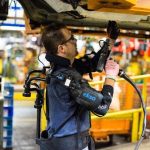As the Mobility Sector Revs Up, Startups and Dealerships Respond

Mobility, in case you haven’t heard, is the up-and-coming tech buzzword driving the future of transportation. As defined by the auto industry, mobility refers to moving goods and people from point A to point B. This encompasses vehicles for personal use, fleet vehicles, public transit, ridesharing, bicycles, car-sharing, self-driving cars, planes, trains, and essentially any other form of motorized transport. It sometimes includes an on-demand or peer-to-peer component.
The evidence of mobility’s growing prominence in Southeast Michigan is everywhere—in next week’s Detroit Startup Week agenda, in the hundreds of applicants trying to get into the Detroit-based Techstars Mobility startup incubator, and in the Detroit Auto Dealers Association’s decision to highlight mobility companies and technologies at next year’s North American International Auto Show. (More on the the auto show effort in a minute.)
Ted Serbinski, who leads Techstars Mobility, has written a blog post that includes a broader definition of mobility: “technologies and services that allow people to move more freely.” Many of the mobility sector’s innovations, he wrote, are in response to changing market forces like urbanization, the rise of the sharing economy (as Millennials in particular reject traditional ownership models), and vast improvements in mobile technology.
Serbinski credits Bill Ford with seeing the potential of mobility before most people did, and Ford will participate in a Detroit Startup Week panel discussion at the Masonic Temple on Monday to talk about the mobility sector’s role in growing the city’s startup ecosystem. In 2009, Ford established Fontinalis Partners to invest in mobility startups, and in 2012, the Ford Motor Company officially launched its Blueprint for Mobility, a corporate strategy for diversifying its product offerings in line with current trends and demographic changes.
Four years later, the rest of the Big Three has jumped on the mobility bandwagon. Earlier this year, GM announced a spate of mobility-related news: It acquired Sidecar’s IP and key employees, announced it was forming a separate entity called Maven to manage its mobility platform, invested $ 500 million in the Lyft ridesharing service, and reportedly paid close to $ 1 billion to buy Bay Area startup Cruise Automation, a producer of “after-market” kits that can turn existing cars into autonomous vehicles. And just a few weeks ago, Fiat Chrysler announced it will partner with Google to develop driverless cars—a potentially brilliant collaboration because each has what the other lacks to get to market.
What Serbinski finds particularly exciting about his Techstars program is its role in defining mobility for a new generation of startups, the influence these companies will have on shaping the industry, and Michigan’s potential to lead the country in developing mobility technologies. Since 2015, when Techstars Mobility incubated its first class of startups, Serbinski has gotten more than 1,000 applications from early-stage companies in 53 countries. Last year’s cohort included startups that eventually chose to relocate permanently to Detroit, most notably SPLT, a business-to-business ridesharing company already experiencing explosive growth.
This year, there was a 26 percent increase in international startups applying to the program, and Serbinski spent nearly 34 hours interviewing candidates via video conferencing between March 20 and May 6. Serbinski said he also saw some trends emerge in the subsectors the incubator candidates represented. The top three areas of focus this time around are new ridesharing models, customer experience (car ownership and leasing) and maintenance on existing vehicles, and preventing distracted driving.
His top takeaways so far this year? That it was significantly harder to narrow the pool of nearly 500 applicants to the 12 that would be accepted into the program, as many were coming in with money already raised and market traction. He also saw more startups with “Millennial and Generation Z-focused approaches for an entirely new era of car owners and personal mobility,” and more that want to incorporate artificial intelligence and big data into products that address all aspects of the transportation ecosystem.
“The mobility space is really heating up as the market gets more mature,” Serbinski said. “We did a better job marketing the program this year, and there’s nothing else like it in the world.”
Despite the chatter in Big Three corporate boardrooms about the angst old-school car dealerships feel over traditional ownership models falling out of favor with younger customers, mobility is also good business. For much of the past decade, significant pent-up demand has been fueling the domestic automakers’ resurgence. As that demand is met, the industry will need to find other ways to make money, such as apps that remind drivers to take their cars in for maintenance, or manufacturer-sponsored ridesharing programs that allow car owners to rent out their vehicles when they’re not being used.
It’s with these business opportunities in mind that the Detroit Auto Dealers Association (DADA), which sponsors NAIAS, decided to highlight mobility at next year’s auto show. Called AutoMobili-D, the dedicated exposition running January 8-12 will showcase the rapidly evolving global automotive and mobility landscape and feature more than 100 companies, including automakers, suppliers, and tech startups.
The concept of AutoMobili-D is a branded show within a show.
Sam Slaughter, DADA’s 2017 NAIAS chairman, said the 120,000-square-foot display will be set up at the base of the stairs on the main floor of Cobo Center, where the auto show is held in downtown Detroit. The plan is to include a test track; different “villages” with themes like connected cars and urban mobility, where startups and established companies will demonstrate their innovations; and formal matchmaking between startups and industry leaders seeking the technologies they’re developing.
“It’s a combination of an exposition and a working conference,” Slaughter said. “There’s a whole new subset of engineers and designers that might not come to the show otherwise. Southeast Michigan is incubating so much of the new technology coming, and our mission is to keep that out in the forefront and offer avenues for collaboration. This is where all the car engineering happens in the United States.”
According to DADA, Michigan ranks first in the nation for its concentration of engineering talent (89,000 people) and number of automotive-related businesses (462). In 2014, Michigan led the nation in connected vehicle projects (45), a growth of 50 percent over the previous year. When I covered the Detroit auto show in January, I wrote that mobility seemed to be the event’s dominant topic of conversation. Slaughter said his organization noticed something similar.
“We sure felt it during the show—mobility seemed to be on everyone’s lips,” Slaughter said. “With AutoMobili-D, we thought, ‘How can we harness mobility more and make it a theme rather than an undercurrent?’ John Q. Public and even the press don’t have the vision of what’s coming and how soon. In my mind, it’s an exciting time to be an automobile retailer.”
That is undoubtedly true, but how do you get a legacy industry like car dealerships on board with the fundamental shift away from personal vehicle ownership? After all, we haven’t even seen widespread adoption of any one digital platform for vehicle transactions, with individual dealerships varying widely in terms of what they offer online. If they can’t crack that seemingly simple nut, how will they successfully deploy driverless cars and ridesharing platforms?
“We’re all watching to see how we interact with these technologies in the real world,” Slaughter said. “Whatever happens with autonomous vehicles and car-sharing, there are still miles that need to be driven, and cars will still need service and maintenance.”
According to Slaughter, AutoMobili-D represents the biggest investment in a stand-alone exhibit DADA has made so far. House of New Mobility, the American Center for Mobility, and Techstars Mobility are partnering with DADA on the exhibit’s content.
“I feel like our timing is good,” Slaughter added. “What will make AutoMobili-D successful are the partnerships and experts we bring to the table.”
(24)













